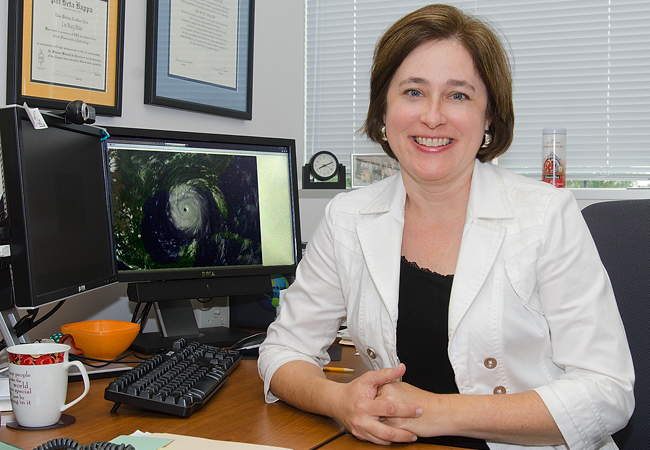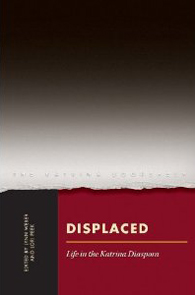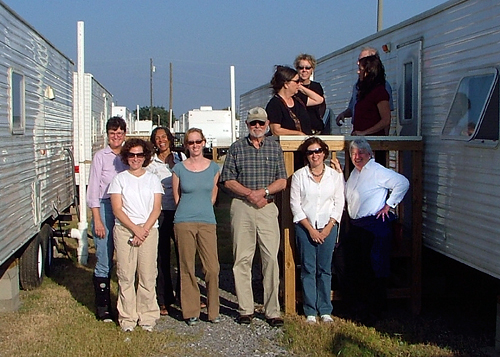Sociology Prof Dedicates Research To Disaster Relief
Aug. 22, 2012
SHSU Media Contact: Jennifer Gauntt
Story by: Amy Barnett
 |
| Associate professor of sociology Lee Miller studies communities' responses to disaster. Her work has allowed her to utilize the Huntsville community's response to Hurricanes Katrina, Rita, and Ike. —Photo by Brian Blalock |
Lee Miller's work on disaster relief is featured in the fall 2012 issue of SHSU's Heritage Magazine. The magazine will be available soon in both print and online versions.
 When Lee Miller came to Sam Houston State University to join the department of sociology in 2005, she was not a stranger to the Huntsville community.
When Lee Miller came to Sam Houston State University to join the department of sociology in 2005, she was not a stranger to the Huntsville community.
Miller lived in Huntsville in the mid-1970s with her family and completed junior high and high school in the Huntsville school district. Little did she know then, the small town she called home would one day inspire extensive research and become the focal point of her contributions to a book entitled Displaced: Life in the Katrina Diaspora.
After graduating from high school, Miller earned a degree in sociology from Smith College in western Massachusetts and then earned her master’s degree and doctorate in sociology from Yale University.
Her dissertation research for her graduate studies took her to Italy where she studied small-firm networks, with a focus on determining how these small companies could compete economically and be successful in an increasingly globalized market place where larger, multinational corporations were prominent.
Miller lived in north-central Italy for 11 years where she worked on a variety of economic development issues, as well as projects in Tunisia and India with the United Nations Industrial Development Organization.
In 2002 she returned to the U.S. and moved to Elizabethtown, Pa., to work in international education.
“I enjoyed working with international programs, but I really wanted to be actively involved in research and teaching,” said Miller.
That desire came true in 2005 when Miller returned to Huntsville as an assistant professor of sociology at SHSU. At the time her research interests were focused on community-based learning, but in August of the same year her research interests broadened when a unique opportunity presented itself.
“Late August 2005 brought us Hurricane Katrina and our community suddenly received a large number of evacuees from New Orleans,” Miller said. “As soon as Hurricane Katrina hit, I was intrigued by how this community reacted to the arrival of evacuees, and I got in touch with some of my advisers from graduate school with expertise in disaster research and asked, ‘what should I do?’”
Miller’s advisers encouraged her to get involved and observe and study the social dynamics as the city of Huntsville and Walker County welcomed evacuees.
“Typically when a disaster happens, it’s in one part of a city or community, and evacuees can stay with friends or family in another part of town, but when we see total devastation like we did in New Orleans and along the Gulf Coast, that is not an option,” Miller said.
The focus of Miller’s research became clear: How does a small community deal with receiving evacuees from other places? How do communities help people who are displaced long-term?
“I have to say I was very proud of Huntsville and Walker County,” Miller said. “Something developed here known in disaster literature as a ‘therapeutic community’ in which we saw a tremendous outpouring of volunteerism, donations and kindness.
“Churches opened shelters and coordinated groups to assist evacuees in local hotel rooms; within two or three days the school district included the shelters on bus routes so children could go to school; local employers who were hiring sent representatives to the shelters to interview; a shuttle service was provided to take people to Walmart or to be reunited with loved ones,” Miller said. “It was all fascinating.”
Communities across the U.S. were experiencing similar initial reactions to the evacuees.
 |
| (Above) The other is a symbolic picture of the devastation that Katrina’s floodwaters left behind. (Below) A group of Social Science Research Council Research Network on Persons Displaced by Hurricane Katrina members in New Orleans’ Lower Ninth Ward. Miller is second from the right, wearing the light blue jacket and sunglasses. —Photos courtesy of Lori Peek, Colorado State University. |
 |
“There were so many people who wanted to donate and volunteer that was hard for them to understand that sometimes they couldn’t because sign-up sheets filled up or there was no place to store their donations,” Miller added.
But here in Huntsville, residents would get the chance to help again, just three weeks later.
“Hurricane Rita hit the Gulf Coast and people from Galveston were told to head to Huntsville because we were, and are, a shelter hub for the state,” Miller said. “With Hurricane Rita, Huntsville grew by 50 percent in size in a matter of hours; an estimated 2.2 million evacuated and many drove through, or stopped, in our town.”
Miller teamed with colleagues across the country who also found themselves studying their communities’ responses to Hurricane Katrina evacuees. The group produced an edited book called Displaced: Life in the Katrina Diaspora, published by University of Texas Press, that focused on how Hurricane Katrina impacted the entire country through its evacuees. Displaced will be launched in New Orleans in October with royalties supporting a community day care in New Orleans.
“We thought, ‘what better way to give back to the community in New Orleans?’” Miller said.
While the response to Hurricane Ike in 2008 demonstrated that Huntsville and the greater Houston area learned a lot from the previous storms, especially in terms of coordinating evacuation, managing contraflow lanes on Interstate 45 and safely evacuating people with functional needs, the storm presented yet another problem.
During Hurricane Ike, Miller collaborated with colleagues to study the delayed restoration of electric power since thousands of residents experienced outages for up to two weeks. This work received international attention after their article was published in The British Journal of Sociology. Miller fears another major storm, or even excessive summer temperatures, will demonstrate that the area is still at risk of more frequent and long-term power outages.
Miller, now an associate professor, remains dedicated to understanding more about disasters.
“Typically when we see a disaster on the news, we see how it impacts the community, but that is really the middle of the story,” she said. “The way we organize our communities, the way we do business and interact with each other creates the conditions the disaster comes into, and that is really the beginning of the story. So now I am looking at how social structure either helps or hinders us when a disaster strikes.”
She has appeared on the Houston PBS program “Houston 8” and on BBC radio’s program “Thinking Allowed” to discuss her work on community responses to disaster.
Miller continues her research on community responses to disaster, but more recently her focus has been on an area of Montgomery County where residents are fighting the arrival of commercial wastewater injection wells.
While residents are concerned about the consequences of pumping liquid waste underneath the Conroe oil field, Miller is studying the community’s attempts to protect itself from the perceived environmental and health risks these wells pose and how it will handle a situation should the wells create future problems.
“I feel fortunate to work at an institution that values community-based research and teaching,” Miller said.
Miller encourages her students to connect to their own communities through research projects and community engagement activities in her courses. These courses provide students with opportunities to collaborate with community organizations and apply their knowledge in real-world settings,” she said.
- END -
This page maintained by SHSU's Communications Office
Associate Director: Julia May
Manager: Jennifer Gauntt
Located in the 115 Administration Building
Telephone: 936.294.1836; Fax: 936.294.1834
Please send comments, corrections, news tips to Today@Sam.edu.

 SamWeb
SamWeb My Sam
My Sam E-mail
E-mail

